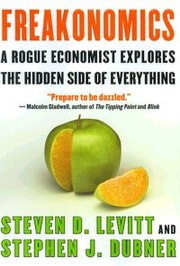
FREAKONOMICS
by Steven D. Levitt and
Stephen J. Dubner (nonfiction)
Published by William Morrow
An imprint of HarperCollins Publishers
ISBN: 006073132X
Copyright (c) 2005 by Steven D. Levitt
and Stephen J. Dubner
I have started reading this book from the email book club: http://www.emailbookclub.com/talk.html
The authors website gives a short write up on what this Freakonomics is about.
One interesting review of this book is given by Mr.Orson Scott Card and makes you feel that this book would cover areas that go well beyond "traditional" economics.
The authors say, "Freakonomics establishes an unconventional premise: if morality represents how we would like the world to work, then economics represents how it actually does work. It is true that readers of this book will be armed with enough riddles and stories to last a thousand cocktail parties. But Freakonomics can provide more than that. It will literally redefine the way we view the modern world. "
The part cited below, however, comes out as pure economics.
An incentive is simply a means of urging people to do more of a good thing and less of a bad thing. But most incentives don't come about organically. Someone--an economist or a politician or a parent--has to invent them. Your three-year-old eats all her vegetables for a week? She wins a trip to the toy store. A big steelmaker belches too much smoke into the air? The company is fined for each cubic foot of pollutants over the legal limit. Too many Americans aren't paying their share of income tax? It was the economist Milton Friedman who helped come up with a solution to this one: automatic tax with-holding from employees' paychecks.
There are three basic flavors of incentive: economic, social, and moral. Very often a single incentive scheme will include all three varieties. Think about the anti-smoking campaign of recent years. The addition of a $3-per-pack "sin tax" is a strong economic incentive against buying cigarettes. The banning of cigarettes in restaurants and bars is a powerful social incentive. And when theU.S. government asserts that terrorists raise money by selling black-market cigarettes, that acts as a rather jarring moral incentive.

No comments:
Post a Comment